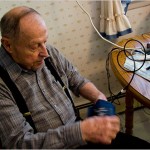 The rise in mobile healthcare is a topic that I’ve touched on a number of times on the blog over the past year or so, and the number of innovations in the field continues apace. A recent paper has highlighted how important mobile monitoring could be for fields such as Alzhiemers and Parkinson’s.
The rise in mobile healthcare is a topic that I’ve touched on a number of times on the blog over the past year or so, and the number of innovations in the field continues apace. A recent paper has highlighted how important mobile monitoring could be for fields such as Alzhiemers and Parkinson’s.
The paper suggests that with an ageing population, it’s increasingly important to have means of monitoring patients in their home so as to reduce the pressure on front line medical services that are increasingly strained for resources. They suggest the need for, what they refer to as, ‘smart care spaces’, which contain sensors and intelligent computer systems to support the needs of the patients, their carers and medical professionals.
They believe that the right use of this kind of technology can offer a significant improvement in the quality of life of patients. They go on to suggest that these technologies might also provide insights into potential new approaches and treatments for a range of diseases, with improvements in the medication regime, exercise and environmental changes to ensure patients manage their disease more effectively.
The researchers reviewed a number of systems on the market, and believe that even relatively simple sensors, such as radio tags or monitors that can detect when a patient falls, could provide cost-effective improvements to care. For instance, if insomnia can be detected in a patient, it can lead professionals to possible alterations to day time care than can improve matters significantly. Many of the devices on the market link up superbly with smartphones, whereby professionals can be alerted the moment things start to get a little sticky for the patient.
They conclude however by suggesting that to truly get the most out of this kind of technology, it needs a holistic approach to their design so that devices aren’t used in isolation.
“It is apparent that much of the technology required to create smart care spaces already exists, but further research is required to integrate them into a functional whole,” the team concludes.